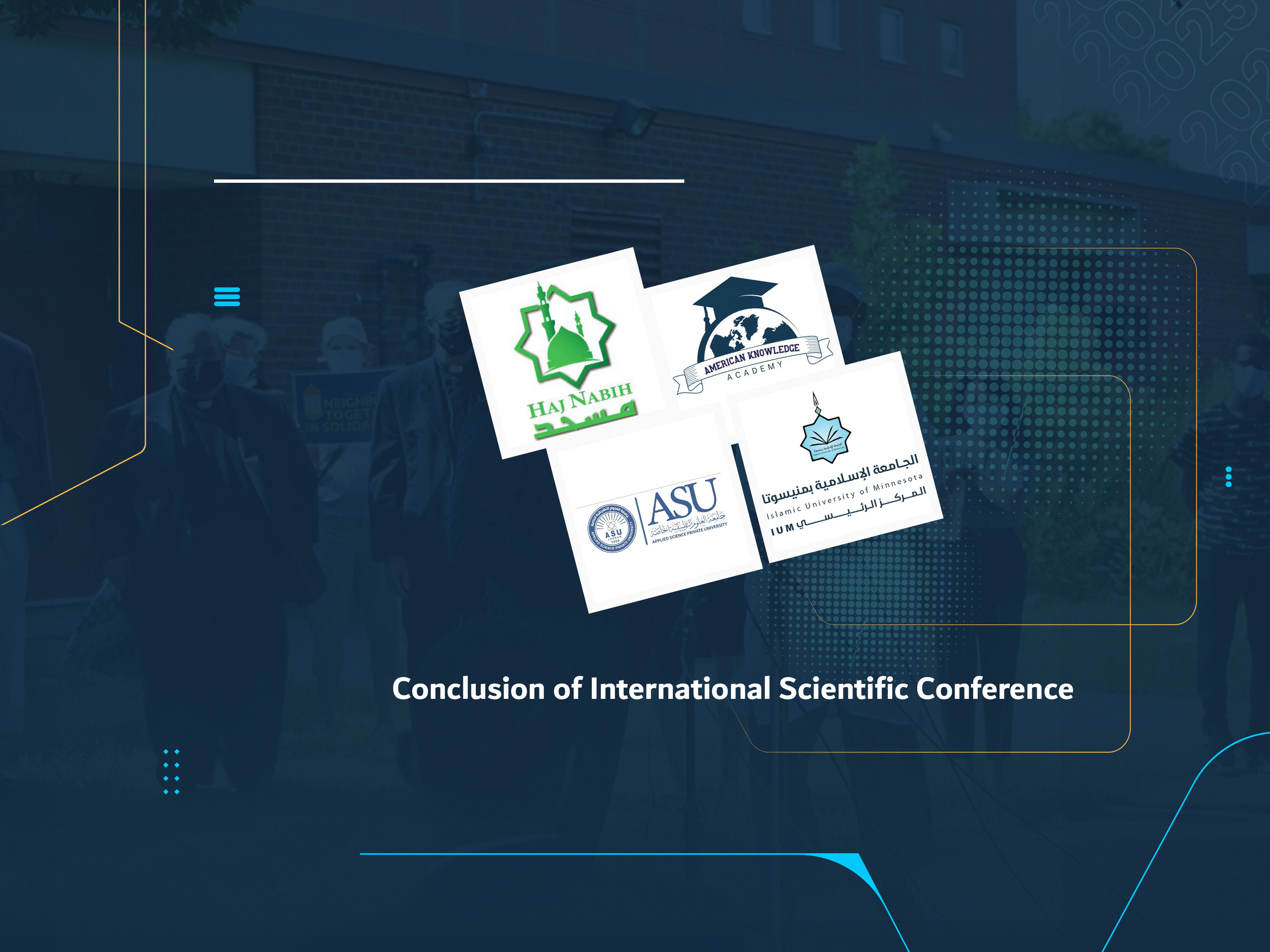Conclusion of International Scientific Conference

The International Scientific Conference "Jurisprudential, Legal, and Educational Developments for Muslims in the West" successfully concluded its proceedings in Houston, Texas, USA. After two days of intensive scientific sessions, the conference yielded constructive recommendations aimed at fostering the integration of Muslims into Western societies while preserving their religious and cultural identity. The conference activities spanned nine hours, divided into four sessions.
The conference commenced on Friday, August 29, 2025, organized jointly by the Islamic University of Minnesota – Main Center, and Al-Ahliyya Amman University in Jordan. The event witnessed the participation of a distinguished group of researchers and scholars from several Arab and foreign countries, including Jordan, Syria, Algeria, Oman, Saudi Arabia, Libya, Turkey, and the United States of America.
The honorary presidency of the conference was held by Professor Dr. Walid bin Idris Al-Meneesi, President of the Islamic University of Minnesota, and Professor Dr. Haitham Abu Khadija, Chairman of the Board of Trustees of Al-Ahliyya Amman University in Jordan. The conference was also chaired by Professor Dr. Omar Al-Maqrami, Vice President of the Islamic University of Minnesota – Main Center, and Professor Dr. Alaa Al-Qudah, General Manager of AMERICAN KNOWLEDGE ACADEMY.
Professor Dr. Emad Ali Al-Khatib, Director of the Conferences and Seminars Management Unit at the Islamic University of Minnesota – Main Center, headed the supreme organizing committees of the conference. Dr. Zainab Bassiouni, Vice President of the Islamic University of Minnesota - Main Center, oversaw the general administration of the conference, with Dr. Hanan Obaid from the same university serving as her deputy. The general secretariat of the conference was undertaken by Professor Dr. Maher Aref, former Director of the Jordanian Scholars Association.
The four sessions of the conference covered diverse and interconnected themes. The first session addressed "Jurisprudential Developments - Between Law and Customs," and the second session focused on "Jurisprudential Developments - Between Education and Ethics." On the second day, the first session was dedicated to discussing "Jurisprudential Developments - Between the Constant and the Changing," while the second session concentrated on "Jurisprudential Developments - in the Age of Artificial Intelligence.
" Dr. Ali El-Shboul, Director of the Latin American Studies Center and Director of the Language Center at the Islamic University of Minnesota, moderated the conference. The opening ceremony featured significant speeches, including a speech by Dr. Zainab Bassiouni on behalf of the University President, a speech by His Excellency Professor Dr. Abdul Nasser Abu Al-Basal, former Minister of Awqaf, Islamic Affairs and Holy Sites and President of the Jordanian Scholars Association, and a speech by Professor Dr. Abdulsalam Al-Fandi representing Al-Ahliyya Amman University in Jordan. Dr. Alaa Al-Qudah emphasized the conference's importance in highlighting the rapid changes faced by Muslims in the West and providing practical solutions to enhance their integration while preserving their identity.
The sessions included presentations of valuable research. In the first session, chaired by Dr. Omar Shuqairat, Professor Dr. Muzahim Tariq Al-Mustafa presented a paper titled "The Role of Endowments in Social and Economic Development," Dr. Ali Ibrahim El-Shboul presented a paper on "Islam in Spain: Past and Present," and Dr. Firas Ali Al-Shiab concluded the session with a paper on "Loyalty and Disavowal in Islam: A Moderate Study.
" In the second session, chaired by Professor Dr. Emad Ali Al-Khatib, Professor Dr. Abdulqader Miloud Salameh and Dr. Amina Ahmed Al-Hashemi presented a joint paper titled "Islamic Culture and Mechanisms for its Preservation in a Multi-Identity Environment," Dr. Majed Nasser Al-Mahrouqi presented a paper on "The Impact of Arab Educational Policies on Shaping the Identity of the Emerging Muslim Generation," Dr. Ayada Ashour Harhour presented a paper on "Mosques and Their Role in Promoting Political Participation of Muslims in the United States," and Dr. Ayman Al-Halhaleh presented a paper titled "Legal Challenges Facing Muslims in the West: Towards a Legal Framework for Protecting Religious Identity.
"The sessions continued on the second day, with Professor Dr. Abdulsalam Al-Fandi chairing the first session, which discussed research including Dr. Hamza Mustafa Yaqoub's paper titled "Sharia Arbitration for Muslim Minorities in the West: Challenges and Solutions – Application to Canadian Law in Commercial and Family Cases," Professor Dr. Emad Ali Al-Khatib's paper on "Rulings on the Sale of Slaves in Jurisprudential Discourse," Dr. Mai Khalid Baklizi's paper on "The Evolution of the Term Zakat Between Ancient and Modern: A Linguistic and Jurisprudential Study," and Dr. Noah MOhammEd Al-Fadoul's paper on "Rulings on Sale in Dealing with Non-Muslims – A Maqasid Study of the Sale of Alcohol and Pork as a Model.
"Professor Dr. Alaa Al-Qudah chaired the second session of the second day, which included a discussion of Dr. Sahar Talaat Al-Samadi and Ms. Ahlam Al-Samadi's paper titled "Human Communication with Smart Converters in the Balance of Islamic Sharia," Mr. Mustafa Nasser Al-Naabi's paper on "Mechanisms for Investing Endowment Funds," Dr. Abdullah Abu Musameh's paper on "Islamic Economic Media in the Age of Artificial Intelligence for Depicting Media Strategies Supporting Financial Inclusion and Economic Integration of Muslims in the West," and Professor Dr. Mansour Ali Al-Qudah's paper titled "The Reliability of the (Kuzu) Methodology in Sharia Auditing.
"The conference sessions concluded with the formation of a recommendations committee comprising participating professors and researchers. Dr. Zainab Basyouni then recited the most important recommendations that emerged from the discussions. These recommendations included highlighting the reality of Muslims in the West and linking conference topics to their daily issues, encouraging the study of Sharia objectives and comparing them with contemporary changes, integrating artificial intelligence technologies such as ChatGPT into the service of Islamic issues, developing specialized software for the Islamic world subject to scientific and technical oversight, and enhancing cooperation between mosques and Islamic centers in the West and charitable institutions in Islamic countries, among other important recommendations.
Finally, the supreme administration of the conference, represented by Dr. Ali El-Shboul, extended its gratitude to the heads of the conference committees from the participating universities and to all committee members who contributed to the success of this prominent scientific event.


